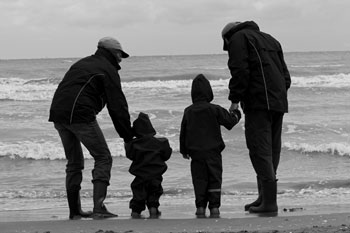| |
Some time
later the son of the woman who owned the house
became ill. He grew worse and worse, and finally
stopped breathing. She said to Elijah, "What do
you have against me, man of God? Did you come to
remind me of my sin and kill my son?"
(1 Kings 17:17-18) |
|
In the power of the
Spirit, Elijah had predicted the impossible: that the
jar of flour and the jug of oil would not run out. The
Lord had worked a miracle, and now, in gratitude, the
widow invited the prophet to come and live in the house
she shared with her son. Thus Elijah entered into a
relatively settled existence for the next three years –
a far longer ‘sabbatical’ than most Christian workers
will ever enjoy.
It says much for Elijah’s character that he was able to
adjust to a life of quiet domesticity. There are some
who can prosper in the silence and solitude of Cherith,
but who find the rigours and demands of home life
irksome. Impatient and intolerant responses reveal how
wide is the gap between high-faluting professions of
faith and the true condition of their heart.
There are many who like nothing better than to be in the
midst of the action. They thrive on the challenge of
‘Mount Carmel-esque’ confrontations and power
encounters. In the process, however, they become
addicted to the glamour and excitement of high-powered
ministry, and find little to satisfy their restless
spirits in the regular round of everyday life. |

Morguefile
|
Whether we like it or not, constant change is here to
stay. Much though we would love good times to last
forever, it can not be. Friends move on, we are obliged
to change jobs, our pastor leaves, and things can never
be quite the same as they were before. May the Lord give
us grace and flexibility to adapt to new circumstances!
The Power of Gentleness
There are few things harder to bear than seeing
hopes that had been raised being dashed. Before the
miracle that had multiplied the oil and the flour, the
widow had resigned herself to die. Now, having come to
expect a full life-span for herself and her son, her
peaceful existence was shattered in the space of a few
cruel hours by the tragedy of her only son falling ill
and dying. She had poured herself into the boy, and her
will to live collapsed. Forgetting all the blessing he
had brought, she rounded on Elijah, and accused the
prophet who had decreed the famine of being the cause of
this tragedy too.
Only those who have experienced the death of a child in
the family can fully understand the devastating
intensity of her feelings. But Elijah must have felt the
loss almost as keenly. Quite apart from his natural
grief, the death of the widow’s son posed him an acute
threat. Had Satan struck the boy to have him driven out
of the home? Where would he go if she threw him out of
her house?
Even when the roof over our head is not riding on an
issue, it is never easy to be blamed unjustly. To be the
target of someone else’s anger exposes our own
insecurities. Knowing these things makes us admire
Elijah’s response the more. If he had replied to the
distraught woman in anger, he would have fallen into the
devil’s trap, and would have missed a unique opportunity
to experience the power of the Lord. In this moment of
extreme crisis, the prophet displayed not only
outstanding faith, but also a graciousness which is the
hallmark of intimacy with God.
This is, unfortunately, not always true of those who
move in prophetic dimensions. Bearing in mind that we
pass on to others what we are, rather than merely what
we say, we should seek the fruit of gentleness in our
lives. Gentleness is used in Scripture in contrast to
contentiousness; it by no means implies weakness or
woolliness.
When a leader is truly gentle in spirit, then the
chances are that the flock will also become mature and
settled. Gentleness is the very opposite of that
stentorian dragooning and haranguing to which so many
leaders subject their precious troops.(1) Gentleness
makes us winsome in the sight of God and man. |

Morguefile |
The Power of the Lord
Elijah could make no more sense of the tragedy than
the widow could, but when the test came, his faith
sprang into action. In Elijah’s agony we see the fruit
of his intimacy with the Lord: a wholehearted
identification and a genuine compassion. Here are costly
qualities we do well to emulate. The word for
‘compassion’ in Greek, might loosely be translated as a
‘gut ache.’
Whenever it is recorded that the Lord Jesus felt
compassion, we see the power of God flowing most freely
to help and to heal. Scripture urges us towards such
whole-hearted participation in each other’s
sufferings.(2)
We have no way of knowing for certain, but the wording
of the widow’s outburst makes one suspect that there may
have been some guilt attached to the birth of the boy.
If this is so, we can imagine how easily she would have
been inclined to view her son’s death as a direct
punishment from God. It certainly shattered her faith.
Elijah had to overcome not only the widow’s anger, but
also the repugnance any Jew would have felt at having to
touch a corpse. Taking her son in his arms, he carried
him to the upper room and laid him on his bed. Then,
stretching himself out on top of the boy’s body, he
cried out to God from the depths of his heart: "O
Lord my God, have You brought tragedy also upon this
widow I am staying with, by causing her son to die? O
Lord my God, let this boy’s life return to him!"(3)
We can feel the intensity of this prayer. Perhaps Elijah
himself was feeling distressed and angry that the Lord
had allowed this situation to come about. What a blaze
of joy he must have felt as the child began to breathe
again!(4) How moving that it should be here, far from
the Promised Land, that we come across the first
recorded instance in Scripture of someone being raised
from the dead.
We can imagine the reunion, as he took the child
downstairs and presented him alive to his mother. The
Lord had restored not only the widow’s son, but her own
heart too. From that moment on she would have been able
to enjoy much closer fellowship with Elijah; now, at
last, she trusted him. More importantly, she trusted his
God. Where, before, she may have been little more than a
nominal believer, now her heart was convinced. Then
the woman said to Elijah, "Now I know that you are a man
of God, and that the word of the Lord from your mouth is
the truth."(5)
|
 |
|
Morguefile |
Elijah spent the next few years with the widow in
Zarephath; a pleasant town, with the steep snow-clad
slopes of Mount Hermon behind him, and fine views over
the blue Mediterranean. After the agony of watching
first the shrinking brook and then the dying boy, Elijah
was rewarded with a long stretch of calm: quite
possibly, the most settled period of his whole life.
Such interludes are to be savoured to the full.
Authority in Prayer
It is intriguing to note how many of the prayers
Jesus and His disciples prayed took the form of
commands. When faced by a sudden storm, the Lord Jesus
did not ask His Father for rescue: He commanded the
storm to be still. When He found Simon’s mother-in-law
in bed with a fever He did not send for a thermometer:
He rebuked the fever. The apostles prayed along similar
lines.(6)Smith Wigglesworth, an early Pentecostal leader,
declared that ‘an ounce of faith is worth a ton of
asking,’ because he rightly saw that so much of our
prayer is little more than the vocalising of our
unbelief. It certainly falls well short of the confident
petition Paul had in mind when he told us that in
everything by prayer and supplication, with
thanksgiving, we should let our requests be made known
to God.(7)
|

Morguefile
|
We need to make our faith comprehensive, to encompass
every part of our lives. The prayer of faith mentioned
in James 5:15 is both specific and definite. It enables
us to exercise the authority of the Lord over Satan,
sickness, and other difficult situations. This is less a
matter of finding the right words – let alone a formula
– than the Holy Spirit within us conferring the
authority and anointing to pray in a particular way.
It is hardly to be wondered at that Satan endeavours so
strenuously to keep believers from using the authority
that is ours in the name of the Lord Jesus. The powers
of darkness know only too well that such faith can
release the power of the Lord in a way in which months
of merely praying about a situation may not succeed in
doing. There comes a moment to stop circling the walls
of Jericho and to utter the shout which brings them
down. Such was the faith Elijah exercised when he cried
out for life to return to the widow’s son.
At the end of that momentous day, Elijah and the widow
could agree together: God is our refuge, and our
strength, an ever present help in trouble. Therefore we
will not fear.’ (8)
The Battle for the Next Generation
Elijah’s struggle to save a child from premature
death points us to the intense spiritual battle we are
waging today for the next generation. Has there ever
been a time before when we have had to pray so hard for
protection against the effects of secular and sinister
influences in the lives of our children? Worldly
stereotypes that embrace amoral and positively
anti-Christian values confront our children daily in
society and in our schools.(9)
| A stable family is a powerful demonstration of the
reality of God’s love. The fact that there are so few of
them about is a measure of the enemy’s hostility. Most
of us go out from home to work and do battle for the
Lord. By the time we return home, our thoughts are often
centred on the need to rest and recuperate. We are glad
to relax, but we often let our defences down too far,
and end up hurting those closest to us by our harsh
words and thoughtless actions. How important it is to
deal promptly with little seeds of resentment and
frustration before they develop into suffocating weeds
of indifference or intolerance. |
 |
|
morguefile |
The extent to which Christian marriage is under threat
today would have been unthinkable a generation or two
ago. Yet the problems we experience would be greatly
reduced if we would admit our difficulties and
temptations and pray for each other more honestly.
Like vintage wines, Christian marriages should improve
as the years pass by. It is just as important in
marriage to try to be the right sort of person as it was
to meet the right partner in the first place. Many of us
husbands need to be more imaginative in expressing our
love for our wives – just as some women would do well to
show that they love their husbands as well as the Lord.
Intimacy with God means being at one with our loved ones
too.
Because the pressures on family life are so great, it
pays to make the effort to get away together before
crises develop. The strains that ensue from not doing so
may not be apparent at the time, but are cumulative,
manifesting themselves at times of heightened tension,
or when the children have finally flown the nest.
Times away are an excellent way of restoring both
personal intimacy and the habit of praying together. But
since the Lord bestows countless answers through those
who pray together, we can be sure the enemy will do all
he can to deter our life of prayer together. Heart-unity
is our vital responsibility, so that nothing will hinder
our prayers.(10)
The fact that Elijah was called to lodge with a widow,
however, speaks directly to God’s concern for the many
single parents of our own day. The Lord does not discard
the disadvantaged; rather, He sovereignly chooses them
to further the purposes of His Kingdom.
Reflections
How we respond in the face of tragedy depends,
to a large extent, on how far we have allowed the power
of the Lord to touch our heart. Like Elijah, we too find
ourselves subjected to serious tests of faith. The way
Elijah handled his sudden crisis is an inspiration to us
in at least five ways:
| |
a) Crises in the
Family
Perhaps, like the widow, you too, are in need of
a miracle of grace for a member of your family.
You have prayed and prayed, but nothing appears
to have changed. Further discernment may be
needed, especially for generational problems,
but do not give up praying now. The Lord hears
the cry of your heart. You may be well-advised,
however, to ask friends who are less emotionally
involved to help you carry the weight of the
burden. They can often see issues more clearly,
and can release the spiritual authority of
objective faith into situations which are
weighing you down.(11)
b) The Power of Prayer
The more we are seeking to lead an Elijah-style
life of truly seeking after God, the more
confidently we can expect miraculous answers to
prayer. At times of urgent need, however, we
need people who will pray with and for us.
I cannot stress too much how important it is to
establish lines of communication in prayer
before we need to use them. Then, when a crisis
develops, we are able to harness prayer straight
away. Examine your own ‘lines of communication.’
Is there anything you can do to improve them?
c) Growth in Character
Elijah’s faith-filled response to the tragedy
enabled the widow to ‘catch’ his faith. Words
are powerful (especially when there is a holy
man or woman behind them) but it is ultimately
who we are, and what we do, that is the
yardstick of our intimacy with God.
To illustrate how important this dimension of
our character is, may I invite you to close your
eyes and think back to one or two of your
earliest teachers. Bless their memory as they
come to mind.
Of all the thousands of words these people must
have addressed to you, how many can you remember
now? Is it not rather the impression of the
person that is stamped in the memory banks of
your mind? For better or for worse these people
helped to shape your life.
Pray to be a man or woman who can respond to
crisis with faith, and whose character shows
forth the likeness of our Risen Saviour.
d) The Witness of the Church
We can imagine that this miracle made a profound
impact on the boy himself as he grew up.
Remembering that more than 75% of all
conversions happen before a person reaches the
age of twenty one, pray for the Church’s efforts
to reach a generation that is growing up with so
little knowledge of God.
e) The Value of Fellowship
It is impossible to overstate how precious
fellowship with the renewed widow would have
been for Elijah. Exiled by the Lord in a foreign
land, where he had no fellow believers with whom
to share his faith, their relationship reminds
us that we should never underestimate the
blessing our letters and phone calls can be to
those who find themselves far from home. Is
there anyone the Lord would have you get in
contact with now? |
|
Selah |
|
| |
Lord Jesus, help
us to move in the power of your Spirit. Grant us
faith for every situation that comes our way,
and a character that speaks of You. We cry out
to You for protection against all the
destructive forces that assail our generation.
We pray particularly for families to grow in the
grace of the Lord; for the love of husbands and
wives to deepen with the passing of the years,
and for their children to be true to You. May
the fruit of gentleness be seen in Your Church,
so that many may come to know the grace of God
for themselves. In Jesus’ name, Amen. |
|
| |

Morguefile |
|
|
|

